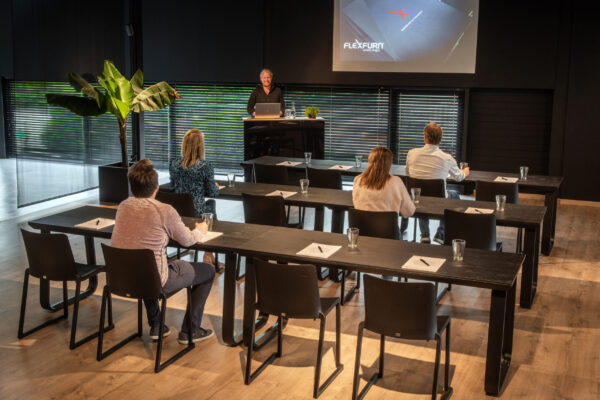A conference room event lets attendees learn more about your industry and network with experts. Hosting your conference in the right space can improve the event experience through technology, collaboration-conducive layouts, and professional decorum. Here are seven tips for hosting a conference room event:
1. Define Event Objectives
Establish clear objectives and goals for the event, as they help guide planning decisions. Some event goals include:
- Share knowledge
- Foster networking
- Promote new products
Your chosen goal can inform your event’s content, speakers, and format. Communicate objectives to your team to align visions during the planning process. Evaluating an audience’s demographics and tailoring the content to their interests helps confirm your event meets the target audience’s expectations. Adequate planning helps speakers and breakout session leaders align their presentations with your goals.
2. Choose Your Facility
Choose conference facilities that fit the size and style you desire. Assess the seating capacity against anticipated attendance for a comfortable experience. Your desired conference layout may impact the number of guests a room can comfortably hold.
Theater-style seating allows large numbers to gather for presentations or roundtable discussions. An informal layout with scattered restaurant tables usually limits attendance but encourages small group discussions and project collaboration. Prioritize venues offering necessary technology, such as screens, Wi-Fi, and microphones. A well-equipped venue helps smooth presentations and maintain audience engagement.
3. Plan for Success
Secure your venue, speakers, and suppliers several months in advance to confirm availability and reduce last-minute delays. Confirm travel, technology, catering, and permits early, and finalize audio-visual needs to avoid last-minute issues. A detailed project plan with timelines, milestones, and assigned roles can help keep your team accountable and on track toward event goals.
4. Integrate Technology
Modern conferences often rely on technology for content delivery and hybrid models. Before the event begins, test Wi-Fi speeds and signal strength for video streaming. Confirm screens and projectors support necessary media formats. Speakers should be equipped with adapters to link their devices to house systems, and presentations should be pre-loaded onto provided laptops to prevent connectivity issues. Completing technology checks before your conference event reduces malfunctions during sessions.
5. Facilitate Networking
Design your agenda to incorporate breaks and activities that promote networking. Adding time before and after sessions for mingling allows attendees to speak with industry peers or further conversations sparked by breakout sessions. Offer a mix of format-specific sessions like discussion groups, panel Q&As, and workshops that match attendees’ interests. Structured group interactions may help foster more meaningful connections than unstructured networking alone. Providing downloadable contact lists helps people connect after the event.
6. Follow Etiquette
Set standards for professionalism at your conference room event by defining guidelines for attendee behavior. Remind participants to respect speaker timelines and turn phones off during sessions. Establishing policies for electronic device usage before events begin helps minimize disruptions. Lead by example and empower your staff to uphold agreed-upon attendee conduct throughout the proceedings.
7. Gather Feedback
Distribute surveys, polls, or moderated forums to attendees for feedback on your event’s strengths and weaknesses. Feedback on venue, content, speakers, audio-visual quality, catering, and networking opportunities can also help you evaluate your event’s success. Constructive criticism often informs your planning for future sessions.
You can also compile the attendee insights into a report to share with your team and applicable partners via email, web post, or printed copies. Letting contributors see positive and negative responses for learning purposes helps build transparency and demonstrates your commitment to success.
Book Your Conference Room Today
A well-planned conference event starts with setting goals to guide decisions about speakers, content, and format that will engage your audience. A venue that offers adaptable technology and tools helps support professional presentations. Some venues also provide catering, bartending, and planning services to help your conference run smoothly. Contact a meeting room rental company today to book a conference room for your next event.
Keep an eye for more news & updates on Ny City Paper!
